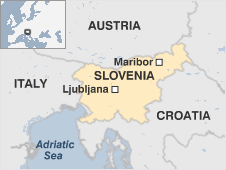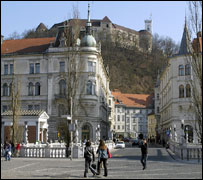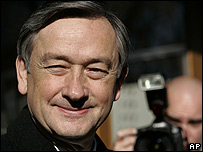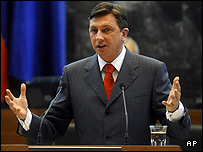 |
A country with spectacular mountains thick forests and a short Adriatic coastline Slovenia also enjoys substantial economic and political stability.
It was the only one of the former Yugoslav republics to be in the first wave of candidates for membership of the European Union. It joined in May 2004.
Just a couple of months before EU entry Slovenia became a member of Nato.
Overview
Unlike Croatia or Bosnia-Hercegovina Slovenia's independence from Yugoslavia was relatively bloodless.
The move was undoubtedly aided by Western European recognition of the Slovenes' aspirations and the low proportion of other ethnic groups in the country.

Ljubljana castle overlooks the capital's old town
|
Slovenia has always been the most prosperous region of the former Yugoslavia and has found the transition from a socialist economy to the capitalist free market easier than most.
On 1 January 2007 it became the first of the new EU member states to join the eurozone.
Politically Slovenia was the most liberal republic within Yugoslavia. Throughout the 1980s there was pressure from Slovenia for greater political freedom and pluralism in the federation.
This reputation was tarnished after independence when thousands of nationals of other former Yugoslav republics were removed from population records and lost residency rights.
Parliament later passed a bill restoring their citizenship but a referendum held shortly before EU entry in 2004 overturned it by an overwhelming margin. Human rights groups expressed dismay at the move which embarrassed the leadership as it prepared to celebrate EU membership.
Slovenia has a rumbling dispute with Croatia over sea and land borders dating back to the break-up of Yugoslavia. Slovenia has said it wants to block Croatian EU membership over the disputes but has dropped its previous opposition to Zagreb's entry into NATO.
On 1 January 2008 it became the first former communist state to take on the EU presidency.
Facts
- Full name: Republic of Slovenia
- Population: 2 million (UN 2009)
- Capital: Ljubljana
- Area: 20273 sq km (7827 sq miles)
- Major language: Slovene
- Major religion: Christianity
- Life expectancy: 75 years (men) 82 years (women) (UN)
- Monetary unit: Euro
- Main exports: Machinery and transport equipment chemicals household goods
- GNI per capita: US $24010 (World Bank 2008)
- Internet domain: .si
- International dialling code: +386
Leaders
President: Danilo Turk
Leftist former diplomat Danilo Turk won the presidential runoff elections in November 2007 ahead of a government-backed conservative.

Danilo Turk
|
Mr Turk garnered 68% of votes compared with the 32% gained by his rival former prime minister Lojze Peterle.
Mr Turk has spent most of his career abroad. He was Slovenia's ambassador to the United Nations from 1992 when the country gained international recognition until 2000 when he became an assistant to the then UN Secretary-General Kofi Annan. He returned to Slovenia in 2005.
The role of president is largely ceremonial but carries authority in defence and foreign affairs.
Prime minister: Borut Pahor
Borut Pahor's Social Democrats narrowly emerged as the largest party at the September 2008 parliamentary elections and formed a coalition government in November. This ended the four years in government of a centre-right coalition under Slovenian Democrat leader Janez Jansa.

Mr Pahor leads the Social Democrats
|
Born 1963 Mr Pahor was involved in the reform wing of the Communist Party in Slovenia during Yugoslav rule in the 1980s.
After independence in 1990 he was elected as a member of parliament for the League of Communists - Party of Democratic Reform rising to be chairman of the successor United List of Social Democrats in 1997.
He led the group in a more centrist direction and became speaker of the National Assembly lower house of parliament in 2000-2004. He changed the party name to the Social Democrats in 2005 and was elected their president.
He was elected to the European Parliament in 2004 where he has served on the budgetary control and constitutional affairs committees.
Media
After independence from Yugoslavia in 1991 Slovenia saw a spectacular development of its broadcasting market reflecting the country's economic success.
The media scene is diverse and free and the constitution supports freedom of expression. The main papers are privately owned and support themselves through advertising.
The broadcasting sector is a mix of public and private ownership. The television market is mainly shared between the public service RTV Slovenia and the private stations Pop TV and Kanal A. There are scores of commercial and public radio stations.
About two thirds of TV households are connected to cable or satellite.
The press
- Dnevnik - Ljubljana-based daily
- Delo - Ljubljana-based daily
- Vecer - Maribor-based daily
- Slovenske Novice - daily tabloid
- Finance - business daily
- Nedeljski dnevnik - weekly
- Mladina - weekly
- Primorske Novice - regional daily
- The Slovenia Times - English-language weekly
Television
- RTV Slovenia - public broadcaster operates two national TV channels and regional services
- Pop TV - commercial
- Kanal A - commercial
Radio
- RTV Slovenia - public broadcaster operates national radio stations A1 Val 202 and Ars regional services and a tourist station with news in English and German
- Radio Hit - commercial
- Radio City - commercial
News agency
-
Slovene Press Agency
AFRICA | ASIA-PACIFIC | AMERICAS | EUROPE | MIDDLEEAST | SOUTHASIA
Mauritania Mauritius Morocco Mozambique Namibia Niger Nigeria Republic-of-congo Rwanda Sao-tome-and-principe Senegal Seychelles Sierra-leone Somalia South-africa Sudan Swaziland Tanzania The-gambia Togo Tunisia Uganda zambia Zimbabwe Australia Brunei Burma Cambodia China East-timor Fiji Indonesia Japan Kazakhstan Kiribati Kyrgyzstan Laos Malaysia Marshall-islands Micronesia Mongolia Nauru New-zealand North-korea Palau Papua-new-guinea Samoa Singapore Solomon-islands South-korea Taiwan Tajikistan Thailand The-philippines Tonga Turkmenistan Tuvalu Uzbekistan Vanuatu Vietnam Antigua-and-barbuda Argentina Bahamas Barbados Belize Bolivia Brazil Canada Chile Colombia Costa-rica Cuba Dominica Dominican-republic Ecuador El-salvador Grenada Guatemala GuyanaHaiti Honduras Jamaica Mexico Nicaragua Panama Paraguay Peru St-kitts-and-nevis St-lucia St-vincent-and-the-grenadines Suriname Trinidad-and-tobago United-states-of-america Uruguay Venezuela Albania Andorra Armenia Austria Azerbaijan Belarus Belgium Bosnia-hercegovina Bulgaria Croatia Cyprus Czech-republic Denmark Estonia Finland France Georgia Germany Greece Hungary Iceland Ireland Italy Latvia Liechtenstein Lithuania Luxembourg Macedonia Malta Moldova Monaco Montenegro Norway Poland Portugal Russia San-marino Serbia Slovakia Slovenia Spain Sweden Switzerland The-netherlands Turkey Ukraine United-kingdom Vatican Algeria Egypt Iran Iraq Israel-and-palestinian-territories Jordan Kuwait Lebanon Libya Mauritania Oman Saudi-arabia Sudan Syria Tunisia United-arab-emirates Yemen Afghanistan Bangladesh Bhutan India Nepal Pakistan Sri-Lanka The-Maldives

